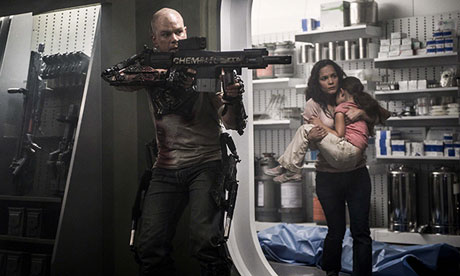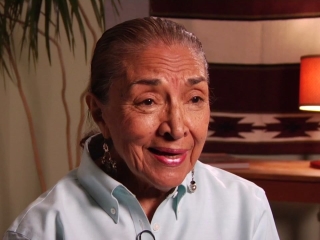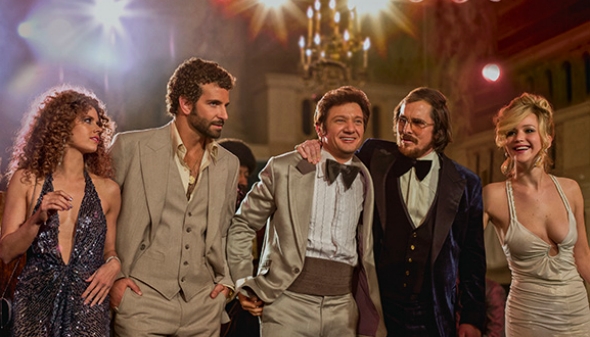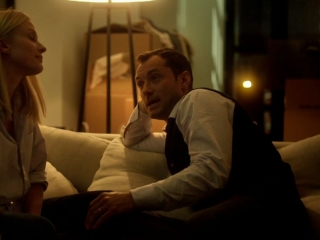David O. Russell's American Hustle and Martin Scorsese's The Wolf of Wall Street are based on true stories about notorious scams of recent memory. American Hustle is a fictionalization of the late 1970's-early '80s FBI sting operation known as Abscam for which the FBI hired convicted con artist Melvin Weinberg to help plan and conduct the operation. The film opens with the onscreen declaration that "Some of this actually happened," and indeed, the film takes the bare bones of the investigation as a springboard for a great long con.
The Wolf of Wall Street is based on Jordan Belfort's memoir describing his genesis in a penny stock boiler room to big time securities fraud to a brief stint in prison to motivational speaker, which is to say to a confidence artist in respectable clothing.
Before I make the case for my defense of American Hustle and my dissatisfaction with The Wolf of Wall Street, allow me to attempt to give my thoughts some context.
The con is not unique to America, but America seems uniquely built upon the con. We're the country of gold rush, land rush, get rich quick, Manifest Destiny and Wall Street. The con is embedded in our vernacular. I don't like people who think they can pull the wool over my eyes, a phrase that appears to have been coined in 1839 in the Milwaukee Daily Sentinel and Gazette: "And we ask one question that they dare not firmly answer, whether they are not now making a tolerable attempt to pull the wool over the eyes of the people."
I include the quote because it is telling (just as the tell gives away a player in poker). Whoever "they" are in that sentence, they are being asked if they are on the up and up and "they dare not firmly answer."
Indeed, we have a large and colorful vocabulary for the con: scam, hoax, flimflam, shell game, euchre, bluff, bunco. The confidence artist is a chiseler, hustler, snake oil salesman, mountebank, hoser, grifter, thimblerig, charlatan, sharpie, shark, who swindles, fleeces, bilks, bamboozles, shakes down, rips off, honeyfuggles, hornswoggles, gulls, gaffles, nobbles, rooks, chouses and knows that the dodge won't work, the game is up if the mark doesn't believe hook, line and sinker. The confidence artist understands that trust is central to the successful fraud and that, not only must the mark be persuaded that he has to have skin in the game, he has to desperately want to get in.
"There's a sucker born every minute," P. T. Barnum purportedly said, and for every sucker there's a confidence trickster. The trickster is as old as the human species. Pagan myth and folklore reflect the human frailties that make us vulnerable to exploitation: credulity, naïveté, vanity, envy, recklessness, dishonesty, and especially greed, but also compassion, generosity -- and trust.
There are surely many more, taking into account the myriad cultural myths across time and geography, but
Wikipedia's list of trickster gods totals 39 starting with Amaguq, an Inuit wolf god, through Wisakedjak, the Algonquin god who destroyed the Creator's world to create the present world of magic. For Carl Jung, the Greek trickster Hermes (Roman Mercury) is, ironically, the good as well as the bad side of narcissism. Narcissism plays a central role in the instinct for self-preservation, but it also accounts for an inflated sense of self that can overshadow conscience.
The trickster's method relies not simply on his cleverness and his subjects' gullibility. What guarantees the trickster's conquest are subjects' unconscious desires
to believe what they want to believe, which is something quite different from simple naïveté. It is self-delusion and denial.
In 19th century America, with immigrants thronging cities, speculators and opportunists going West, and Carpetbaggers exploiting Reconstruction in the South, conditions were ripe for fraud and deception of every stripe. In the United States, the idea of reinvention and the self-made man had become central to the young country's identity. From Benjamin Franklin's
The Autobiography, written over the course of almost 20 years in the latter part of the 18th century, to Horatio Alger's rags to riches stories that saturated the 19th, the insistence that with enough determination and hard work, material success is within anyone's grasp fueled the popular imagination.
But... sometimes pulling yourself up by your own boot straps isn't, in fact, enough, so it comes as no surprise that the corollary to the myth of the self-made man is the confidence man. William Thompson, for whom the term "confidence man" was coined, was the source for Herman Melville's 1857
The Confidence Man: His Masquerade. "Have you confidence in me to trust me with your watch until tomorrow?" Thompson would ask his mark. When given the watch, Thompson would walk away.
There has been no end of real life swindlers and impostors. Notorious con artists of the 19th century included Denver's Lou Blonger, who ran the "Million Dollar Bunco Ring" using the "Wire Con" like the one depicted in George Roy Hill's 1973
The Sting;
Big Bertha Heyman: The Confidence Queen, who swindled thousands out of men, including her own attorney, even behind bars; Canada Bill Jones, King of the Three-Card Monte, about whom the German writer Karl May wrote two stories, "Ein Self-man" (1878) and "Three carde monte" (1879); Victor Lustig, "the man who sold the Eiffel Tower," and George C. Parker who sold the Brooklyn Bridge twice a week for years; Charles Ponzi, of course, whose name has become synonymous with get rich quick pyramid schemes; Soapy Smith of the prize package soap sell racket; and Joseph "Yellow Kid" Weil who is alleged to have said, "Each of my victims had larceny in his heart."
In the 20th century, Bert Cantor's
The Bernie Cornfield Story chronicles Cornfield's Investors Overseas Services, a company that sold mutual funds to American servicemen in Europe in a lucrative Ponzi scheme; Ferdinand Waldo Demara, "The Great Impostor," whose sobriquet provides the eponymous title for Robert Mulligan's 1961 movie, with Tony Curtis in the role, which itself is based on Robert Crichton's 1959 biography; Don Lapre, a TV pitchman who hawked get rich quick schemes; and Alvin Clarence "Titanic Thompson" Thomas, an ambidextrous golfer, card and pool shark, and proposition bet con man who is the model for Sky Masterson in Damon Runyon's 1933 story "The Idyll of Miss Sarah Brown" on which Frank Loesser's 1950
Guys and Dolls is based.
Still with us are Frank Abagnale, a check forger and impostor whose 2000 autobiography is the basis for Steven Spielberg's 2002
Catch Me If You Can; Marc Stuart Dreier, convicted for an investment fraud Ponzi scheme and chronicled in a 2012 BBC documentary, "The $750 Million Thief"; James Arthur Hogue, who was accepted into Princeton posing as a self-taught orphan and is the subject of David Samuels's 2008 biography
The Runner: A True Account of the Amazing Lies and Fantastical Adventures of the Ivy League Impostor James Hogue and of Jesse Moss's 2003 documentary
Con Man; Bernie Madoff, who admitted to the largest Ponzi scheme in history and is chronicled in Jeff Prosserman's 2011 documentary
Chasing Madoff based on Harry Markopolos's 2010 biography
No One Would Listen: A True Financial Thriller (An HBO movie starring Robert De Niro based on Diana Henriques's book
The Wizard of Lies is upcoming.); Barry Minkow, founder of ZZZZ Best scam, another Ponzi scheme; Richard Allen Minsky, whose sex scams were so vile I do not wish to describe them however briefly here; Lou Pearlman, convicted of one of the largest and longest-running Ponzi schemes in American history and who, with co-author Wes Smith, published
Bands, Brands and Billions: My Top 10 Rules for Making Any Business Go Platinum in 2002; Steven Jay Russell, con artist and prison escapee whose life was the basis for Glenn Ficarra and John Requa's 2009
I Love You Phillip Morris; Kevin Trudeau, convicted of larceny and credit card fraud, a true latter-day snake oil salesman who touted his books
Natural Cures "They" Don't Want You to Know About and
The Weight-Loss Cure "They" Don't Want You to Know About on late night infomercials getting him into serious trouble with the U.S. Food and Drug Administration; and Jack Abramoff of the Indian lobbying scandal from the mid-1990s-mid-2000s, in which Ralph Reed, Grover Norquist and Michael Scanlon also participated, that involved grossly over-billing Native American casino gambling interests, secretly orchestrating lobbying
against clients in order to squeeze them for redoubling lobbying services, and giving illegal gifts and campaign donations to congressmen in return for legislation -- energetically recounted with Kevin Spacey as the manic Abramoff in George Hickenlooper's 2010
Casino Jack.
Other films based on con artists include Fred Schepisi's 1993
Six Degrees of Separation adapted from John Guare's 1993 play based on the real-life con artist David Hampton; Brian Cook's 2006
Color Me Kubrick about Alan Conway who impersonated the director during the 1990s; Steven Soderbergh's 2009
Informant! about Mark Whitacre, who in the early '90s, blew the whistle on a price-fixing scheme and aided the FBI in a sting all in an attempt to hide his own embezzlement; and Bart Layton's 2012
The Imposter, which explores the story of French con artist Frédéric Bourdin, who took the identity of Nicholas Barclay, a boy who went missing from San Antonio, Texas.
The confidence man first emerges as a fictional character in 19th century American literature and becomes one of its most enduring narrative figures. Edgar Alan Poe's tales, such as "Diddling" (1843) and "Hop-Frog" (1849); Mark Twain's
The Adventures of Huckleberry Finn (1884); F. Scott Fitzgerald's
The Great Gatsby (1925); Nathanael West's
Miss Lonelyhearts (1933); Ralph Ellison's
Invisible Man (1952); Flannery O'Connor's stories in
A Good Man Is Hard to Find (1953); and Patricia Highsmith's
Ripliad:
The Talented Mr. Ripley (1955), adapted as
Purple Noon by René Clément in 1960 and under its original title by Anthony Minghella in 1999;
Ripley Under Ground (1970) adapted in Roger Spottiswoode's 2005 film;
Ripley's Game (1974) filmed by Wim Wenders as
The American Friend in 1977 and under its original title by Liliana Cavani in 2002; and
The Boy Who Followed Ripley (1980) and
Ripley Under Water (1991), both adapted for BBC Radio 4 in 2009.
Not to mention our fictional movie confidence artists in Preston Sturges's 1941
The Lady Eve; Joseph Anthony's 1956
The Rainmaker; Irvin Kershner's 1967
The Flim-Flam Man; Mel Brooks's 1968
The Producers; John Schlesinger's 1969
Midnight Cowboy; Paul Bogart's 1971
Skin Game; Joseph Mankiewicz's 1972
Sleuth from Anthony Shaffer's 1970 play; Peter Bogdanovich's 1973
Paper Moon; George Sluizer's 1988
The Vanishing; Frank Oz's 1988
Dirty Rotten Scoundrels; Stephen Frears's 1990
The Grifters; Bryan Singer's 1995
The Usual Suspects; James Foley's 2003
Confidence; Ridley Scott's 2003
Matchstick Men; and Rian Johnson's 2009
The Brothers Bloom, to name some of the highlights among many others.
The real life criminality of AIG, Goldman Sachs, Lehman Brothers, Bear Stearns, Merrill Lynch, Citigroup, Morgan Stanley, Countrywide Financial and Ameriquest that caused the Great Recession of 2007-2008 can also be viewed through the narrative lens of the movies. In 1974, when Roman Polanski's brilliant
Chinatown came out, greed was a sleazy affair. Even in 1984, when David Mamet won the Pulitzer Prize for
Glengarry Glen Ross, our protagonists still had a sordid air and an awareness that they transgressed. But by 1987's
Wall Street, with Ronald Reagan well into his second term, Oliver Stone does not mince the words he gives to Gordon Gekko to describe the prevailing zeitgeist: "Greed is good," a mantra many hungry young MBA's took up as they headed to Wall Street.
Martin Scorsese's 1995
Casino, based on Nicholas Pileggi's reporting, is about THE place that is about greed, so that one came as no surprise except perhaps in its sheer scope. But by 2010, executives who have lived by greed's code have the rug pulled out from under them in John Wells's
The Company Men.
On the heals of downsizing the company men, we get a telling of the crash in 2011's
Margin Call in which C.J. Chandor repeatedly emphasizes that no one at the top understands the Byzantine, arcane financial instruments Wall Street wonks have created, and just as it played out in real life, everyone makes sure not to be held accountable. The film even manages to elicit sympathy from us, whereas we have more contempt for Richard Gere's Robert Miller in Nicholas Jarecki's 2012
Arbitrage. Miller sells his company for 500 million having cooked the books to hide the 412 million that's gone missing. James Mayfield (Graydon Carter) is told of the deception moments after he's signed the agreement and Miller has taken his leave. Mayfield smiles wryly and shrugs. It doesn't matter. He's awash in so much money, the missing sum is a mere trifle.
Greed played a very big role on 2013's movie bill. Discussed elsewhere: Michael Bays's
Pain and Gain in
Biopics, a chronicle of the true story of the bumbling gym-rat trio who kidnapped Victor Kershaw and proceeded to turn the metaphor of behaving like a kid in a candy store into a literal pig-out; Woody Allen's
Blue Jasmine in
Women's World, a character examination of a divorcee scheming to live in the manner to which she has become accustomed; as well as
American Hustle and
The Wolf of Wall Street, in which crooked broker Jordan Belfort, to literalize two more metaphors, is rolling in dough and has money to burn.
Whereas
Glengarry Glen Ross takes us into the seedy world of the short con in shady real estate sales -- which have a long history in the United States -- Mamet's 1987
House of Games is a brilliant example of the long con. A patient reveals to his psychiatrist Margaret Ford (Lindsay Crouse) that his life is being threatened by a loan shark to whom he is deeply in debt. Ford ventures to the pool hall where Mike (Joe Mantegna) conducts business. Mike convinces her to accompany him to a card game to help him spot a player's tell. She gets sucked into the rush enough to volunteer $6,000 of her own money, which, of course, is the set up, but they have to pack up the con when she notices a give-away drop of water hanging from the barrel of the gun the player pulls on her. Infected with the excitement, nevertheless, she convinces Mike to let her follow him. At one point, Mike explains the confidence game to her. The con man gives his trust to the mark, which makes the mark trust the con man, thus developing the relationship of one trustworthy person seeking another trustworthy person. That's as much as I'll give away.
Suffice it to say
House of Games is one of the greatest long cons in the movies, and the perfect vehicle for Mamet, whose entire oeuvre explores the degree to which
we will convince ourselves of that which we wish to believe. From 1982's
The Verdict, 1992's
The Water Engine, 1994's
Oleanna, 1996's
American Buffalo (in which the two protagonists maddeningly refuse to look up the value in the Blue Book), to 1997's
The Spanish Prisoner and
Wag the Dog -- the majority of Mamet's oeuvre explores the extent to which
human beings believe what they want to believe. Though not his best work, 1997's
The Edge is notable in that, of the two protagonists, Anthony Hopkins's character survives because he refuses to delude himself. Unflinchingly looking reality in the eye, facing the facts as they are, he may be unique among Mamet's protagonists.
Americans like transgression and our favorite narrative heroes are transgressors and criminals who throw into question bourgeois values. As much as Americans will always be saddled with the Puritan ethic, we are equally defined by transgression. Prohibition's corollary was the bootlegger, and the Great Depression made folk heroes of criminals like Jesse James, John Dillinger, Pretty Boy Floyd and Bonnie and Clyde -- glorified as latter-day Robin Hoods when they were nothing of the sort, Woody Guthrie's romanticized "Ballad of Pretty Boy Floyd" notwithstanding. This is not to say that the Pinkertons and FBI who pursued them were any less criminal.
Later, in post-War America, Jack Kerouac led the way for a Beatnik counter culture, then Haight-Ashbury, "sex, drugs and rock 'n' roll," Timothy Leary and Ken Kesey. Arguably, Americans were more in love with The Rolling Stones than the Brits, and all the while, one musician after another succumbed to overdose.
Poet musicians, most especially Bob Dylan, possess an innate understanding of this undertow in the American psyche, what Greil Marcus calls "the old, weird America," a phrase he coined to describe the songs collected in the
Anthology of American Folk Music by Harry Smith for Smithsonian Folkways and first released in 1952. The ballads and blues and country songs' lyrics often dwelt on murder, death and the macabre. The
Anthology unearthed Blind Lemon Jefferson, Mississippi John Hurt, Dick Justice and many, many others -- some still obscure -- and brought them to the attention of young musicians who became the force behind the folk and blues revival of the 1950s and '60s, most notable among them Bob Dylan. Before Dylan, Pete Seeger had chosen to blinker himself from this darker side of the American vernacular, opting to revive rosier subject matter.
To return to
American Hustle and
The Wolf of Wall Street --
American Hustle is the Horatio Alger story. Irving Rosenfeld (Christian Bale -- and it was wonderful to see him in this incarnation after having seen his excellent performance as a completely different type in
Out of the Furnace the week before) and Sydney Prosser (Amy Adams as one of those deeply intuitive women she plays so well as she did in Paul Thomas Anderson's 2012
The Master) are two people who have had to learn to live by their wits. Each comes from nothing but has been determined to make it and, in their own way, they have. Yes, they are con artists, but they know their limitations, and they are careful never to get in too deep. When FBI agent Richie Di Maso (Bradley Cooper, again in fine manic form) entraps, then recruits them, they plan a good, solid sting. But as Di Maso's head swells, Irving and Sydney know things are getting out of hand. They are very, very smart people who save themselves when they know the jig is up. The film is fast-paced. Jeremy Renner as the mayor of Camden, New Jersey, and Jennifer Lawrence as Irving's passive aggressive wife round out a superb ensemble. (To his credit, Russell has enormous respect for ensemble, and has been assembling a great one.)
The Wolf of Wall Street, on the other hand, lacks any of the humanity of Russell's film. In fact, ever since Scorsese (for whom I had always had the greatest admiration) cast Leonardo DiCaprio in
The Gangs of New York in 2002, the collaborations have been self-indulgent disasters.
The Wolf of Wall Street is no different. I said that
American Hustle's Irving and Sydney are very, very smart people who know when it's time to give up the game rather than risk exposure. DiCaprio's Jordan Belfort is not smart. He's clever, he's lucky, he's a skilled manipulator, but there's no there there. True, Irving and Sydney have chosen to make a living preying on other people's vulnerabilities, but they still have a moral compass. Belfort has no such thing, not the merest vestige, nor do any of the people with whom he surrounds himself, including Donnie Azoff, played by Jonah Hill, another self-indulgent actor of whom I am not fond.
I'm not asking for agitprop, but were
The Wolf of Wall Street about something more than greed, about something more than knuckleheads who never, ever learn a lesson no matter how many times they, to use an AA term, hit rock bottom, it might have some redeeming value. As it is, it's just gratuitous aggrandizement of greed.
Americans not only have a talent for reinvention, they have convinced themselves that they really can get rich quick, that they deserve the good life and any means to get it are justified by the ends. America is the birthplace of the how-to manual and subsequently, of the self-help book, a veritable
$10 billion a year industry, and each generation produces a crop of its own secular quasi-gurus.
Wallace Wattles published
The Science of Getting Rich in 1910, and it is still in print today. The 1930s ushered in Dale Carnegie's
How to Win Friends and Influence People and Napoleon Hill's
Think and Grow Rich. During the 1940s we seem to have been too preoccupied with the war to have been distracted by self-help flimflam -- though L. Ron Hubbard was cooking up his theory of Dianetics which would later become Scientology -- but in 1952 Norman Vincent Peale sprang
The Power of Positive Thinking on post-war Americans, and we were again agog. Maxwell Maltz followed in 1960 with
Psycho-Cybernetics, and the '70s brought Wayne Dyer's
Your Erroneous Zones and Zig Ziglar's
See You at the Top. The 1980s saw Malcolm Baldrige's TQM (Total Quality Management) and the flowering of the Stephen Covey empire with
The 7 Habits of Highly Effective People. The '90s opened with Anthony Robbins's
Awaken the Giant Within, followed in mid-decade by the craze over Emotional Intelligence (EI) and Deepak Chopra's
The Seven Spiritual Laws of Success, then Eckhart Tolle's
The Power of Now rounded out the decade. Jim Collins welcomed the new millennium with
Good to Great. Not to mention your Phil Donohues, Ophrah Winfreys, Dr. Phils, et al.
Hell, America even has its own homegrown gospel of success. Prominent leaders in the development of prosperity theology include E. W. Kenyon whose 1938
Signposts on the Road to Success formed the foundation for Oral Roberts, A. A. Allen, Robert Tilton, T. L. Osborn, Joel Osteen, Creflo Dollar, Kenneth Hagin, and their even more cockamamie offshoots, Jim and Tammy Bakker and Jerry Falwell. None of which ask us to do the really hard work of the examined life. We can have it all, we insist, without reflection. Just gimme some Dr. Kilmer's Swamp Root, Zoloft,Viagra, Botox, cut-rate insurance and a Ninja mortgage. Lemme win the Publishers Clearing House Sweepstakes and the HGTV Dream Home Giveaway, scrape off my lottery ticket and play the stock market -- and I shall enter Valhalla. Which, of course, is a sham, a house of cards, a narcissistic delusion.
Alexander Payne's
Nebraska perfectly reflects the degree to which this kind of thinking has been drummed into us, and how easily we accept the wolves in our midst, from Wall Street to Main Street. We've based an entire nation state's economy on nothing more than a crap shoot. Irving and Sydney ultimately go legit, which is to say, at least they try to grow up. If Jordan Belfort the man,
The Wolf of Wall Street the movie, and the real-life denizens of Wall Street are any indication of the zeitgeist, however, a reflection that we want to dwell in a state of arrested adolescence forever and that
we have convinced ourselves of what we so desperately want to believe which is that the refusal to accept personal and civic responsibility is perfectly OK, even a desirable state of affairs, then believe it we shall.
American Hustle






















































